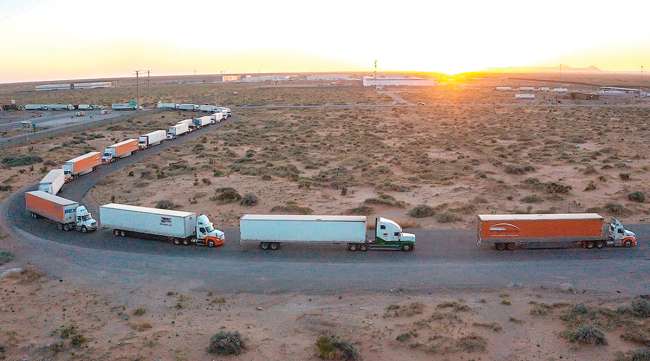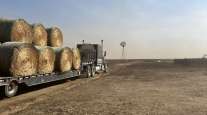Staff Reporter
Trucking, Economic Experts Weigh Impact of Texas Border Bottlenecks

[Stay on top of transportation news: Get TTNews in your inbox.]
Financial reverberations from days’ worth of bottlenecks at the border between Texas and Mexico will be felt for months, trucking and economic experts said.
The delays, which choked the border from April 6-15, arose after Texas Gov. Greg Abbott ordered the state’s Department of Public Safety to conduct additional vehicle safety inspections in a move Abbott said was designed to curtail the movement of drugs, illegal immigrants, weapons and more into Texas. But the inspections — which critics said duplicated inspections already being done — quickly led to gridlock and caused consternation across the trucking industry.
“I think the decision was very sudden, and came a little bit out of left field. The supply chain was already strained,” said Ernesto Gaytán Jr., Texas Trucking Association chair and general manager of Super Transport International. The company has 600 trucks and 1,400 trailers and operates from Texas offices in Laredo, Dallas and Houston, along with locations in Tennessee, Indiana and Michigan and seven in Mexico.

Ernesto Gaytán Jr.
“Here in Laredo we cross 17,000 loads per day. So, anytime you slow down the supply chain everything gets affected – driver hours while waiting for loads, drivers taking longer to cross over and not having enough time for breaks.”
When the added inspections were being conducted, Gaytán said his drivers were waiting three to eight hours to cross the border — something that normally takes an hour. And those delays hurt business, he said.
“It’s hard to put it into a dollar figure, but obviously it slows down your productivity for the trucks and that has an impact economically,” he said.
A report from economist Ray Perryman, president and CEO of economic consulting firm The Perryman Group in Waco, estimated that the logjam cost about $1 billion a day in cross-border trade to the U.S. and $470 million a day to Texas. It calculated that Texas lost more than $4.2 billion in goods and services and the equivalent of 36,000 jobs.
American Trucking Associations criticized the impact the program had across the industry. “These duplicative screenings of commercial vehicles on our southern border are unleashing a negative, tangible downstream impact, hurting businesses and employees in other parts of the country who have no say and no responsibility over federal border policy,” ATA President Chris Spear said in an April 15 statement. Spear noted that 3.3 million loaded trucks entered the U.S. from Mexico last year.
According to the Bureau of Transportation Statistics, U.S. freight traffic with Mexico last year was valued at $661 billion, with the port of Laredo leading at $242 billion. Across January and February, this year, the value of trade crossings at Laredo rose 16.7% to $41 billion.
“If you’re not moving and not working, it’s a loss of productivity,” said Transport Futures economist Noël Perry. “Longhaul trucks move a load every other day. If you spend two or three days waiting, you lose a load.”
He predicted the economic impact of the inspection delays will take a few months to settle out due to pent-up demand stemming from the inability of goods to flow smoothly.

Russ
Katheryn Russ, an economics professor at University of California-Davis and research associate at the National Bureau of Economic Research, said the effects of the disruptions will be felt by consumers and the producers of goods, especially perishable agriculture.
The International Fresh Produce Association said “produce that was destined to United States consumers, in some cases, will have to be destroyed because of the perishability of our products” and result “in millions of lost economic production.”
“I think people consider it as a state or local issue when they read about it, but it’s not local and will result in an economic shock for the whole country,” Russ said of the border gridlock.
Want more news? Listen to today's daily briefing above or go here for more info
“Everyone’s fighting for capacity,” added Gaytán. “The demand is so strong right now. I have customers really, really asking to give them capacity, when I’m at full capacity. I have trucks available — however, it’s hard to get drivers through the door and this doesn’t help.”
Longer-term, Gaytán said local, state and federal officials could help Laredo’s border trade achieve future growth by improving roadway infrastructure that struggles with congestion, including expansion along Interstate 35. “You can’t base it on a population like a lot of these formulas have done for funding,” he said, noting that one key road connected to two bridges experiences constant traffic backups because it only has two outlets to I-35.
Gaytán also stopped short of criticizing Abbott, noting that the governor has supported trucking on issues such as lawsuit abuse. In this case of the border inspections, Gaytán suggested, more communication may have aided the situation.
“A little more dialogue with us could have maybe helped a little better in how this was done,” he said.



